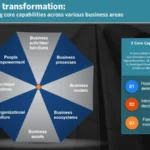 We love stumbling across terrific articles while doing researching for our clients. i-scoop.eu wrote this about the definition of digital transformation. For the purposes of this blog post, we have pulled i-scoop’s exact wording of how they explain it.
We love stumbling across terrific articles while doing researching for our clients. i-scoop.eu wrote this about the definition of digital transformation. For the purposes of this blog post, we have pulled i-scoop’s exact wording of how they explain it.
Digital transformation is the cultural, organizational and operational change of an organization, industry or ecosystem through a smart integration of digital technologies, processes and competencies across all levels and functions in a staged and strategic way (also see digital transformation strategy).
Read the full article here
Digital transformation in the integrated and connected sense which it requires can, among, others, touch upon the transformation of:
- Business activities/functions: marketing, operations, human resources, administration, customer service, etc.
- Business processes: one or more connected operations, activities and sets to achieve a specific business goal, whereby business process management, business process optimization and business process automation come into the picture (with new technologies such as robotic process automation). Business process optimization is essential in digital transformation strategies and in most industries and cases is a mix of customer-facing goals and internal goals today.
- Business models: how businesses function, from the go-to-market approach and value proposition to the ways it seeks to make money and effectively transforms its core business, tapping into novel revenue sources and approaches, sometimes even dropping the traditional core business after a while.
- Business ecosystems: the networks of partners and stakeholders, as well as contextual factors affecting the business such as regulatory or economic priorities and evolutions. New ecosystems are built between companies with various background upon the fabric of digital transformation, information, whereby data and actionable intelligence become innovation assets.
- Business asset management: whereby the focus lies on traditional assets but, increasingly, on less ‘tangible’ assets such as information and customers (enhancing customer experience is a leading goal of many digital transformation “projects” and information is the lifeblood of business, technological evolutions and of any human relationship). Both customers and information need to be treated as real assets in all perspectives.
- Organizational culture, whereby there must be a clear customer-centric, agile and hyper-aware goal which is achieved by acquiring core competencies across the board in areas such as digital maturity, leadership, knowledge worker silos and so forth that enables to be more future-proof. Culture also overlaps with processes, business activities, collaboration and the IT-side of digital transformation. In order to bring applications faster to market changes are required. That’s the essence of DevOps: development and operations. In order to make IT and OT work together in businesses/processes/activities, change is required too (it’s not just the information and operational technologies, it’s the processes, culture, collaboration). Etc.
- Ecosystem and partnership models, with among others a rise of co-opetive, collaborative, co-creating and, last but not lost, entirely new business ecosystem approaches, leading to new business models and revenue sources. Ecosystems will be key in the as-a-service-economy and in achieving digital transformation success.
- Customer, worker and partner approaches. Digital transformation puts people and strategy before technology. The changing behavior, expectations and needs of any stakeholder are crucial. This is expressed in many change subprojects whereby customer-centricity, user experience, worker empowerment, new workplace models, changing channel partner dynamics etc. (can) all come in the picture. It’s important to note that digital technologies never are the sole answer to tackle any of these human aspects, from worker satisfaction to customer experience enhancement. People involve, respect and empower other people in the first place, technology is an additional enabler and part of the equation of choice and fundamental needs.
This list is not exhaustive and de facto the several mentioned aspects are connected and overlap. We do look at some less business-related ‘digital transformation’ phenomena and at so-called disruptions but the focus is on the business, which by definition means a holistic digital transformation view whereby aspects such as customer experience, technological evolutions and innovation with a clear purpose, instead of a buzzword, are crucial elements.
So, digital transformation is certainly not just about disruption or technology alone. It is even not just about transforming for a digital age. If it were the latter, one has to realize that this digital age exists since quite some time and is relatively vague.
Thanks i-scoop for a truly insightful read.
